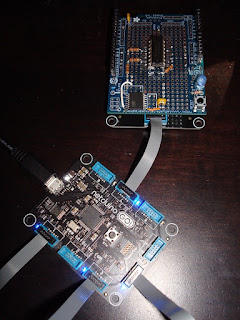I got this working in the first few hours of bringing the Netduino Go home from the Maker Faire Bay Area show. It was nice meeting Chris and getting to hear about Netduino Go's history and specs. Thanks Chris!
-Dave VW
http://techwithdave.blogspot.com/

public static void Main()
{
NetduinoGo.ShieldBase shield = new NetduinoGo.ShieldBase(GoSockets.Socket7);
SPI.Configuration spi_config = new SPI.Configuration(shield.Pins.GPIO_PIN_D2, false, 1, 1, false, true, 1000, SPI.SPI_module.SPI1);
SoftwareSpi spi = new SoftwareSpi(spi_config, shield);
byte[] write_buffer = new byte[1];
write_buffer[0] = 0x9f; // JEDEC-ID
byte[] read_buffer = new byte[3];
int iter = 0;
while (true)
{
string message = "hello " + ++iter + "\r\n";
Debug.Print(message);
spi.WriteRead(write_buffer, 0, write_buffer.Length, read_buffer, 0, read_buffer.Length, write_buffer.Length);
DisplayHex(read_buffer);
Thread.Sleep(250);
}
}
static void DisplayHex(byte[] src)
{
string s = string.Empty;
foreach (byte data in src)
{
for (int bit = 4; bit >= 0; bit -= 4)
{
int nibble = (data >> bit) & 0xF;
if (nibble < 10)
s += nibble.ToString();
else
{
Char c = (Char)('A' + nibble - 10);
s += c.ToString();
}
}
s += " ";
}
Debug.Print(s);
}
}
public class SoftwareSpi
{
SPI.Configuration config;
OutputPort ss;
OutputPort sck;
OutputPort so;
InputPort si;
public SoftwareSpi(SPI.Configuration config, NetduinoGo.ShieldBase shield)
{
this.config = config;
ss = new OutputPort(config.ChipSelect_Port, !config.ChipSelect_ActiveState);
if (config.SPI_mod == SPI.SPI_module.SPI1)
{
sck = new OutputPort(shield.Pins.GPIO_PIN_D13, config.Clock_IdleState);
so = new OutputPort(shield.Pins.GPIO_PIN_D11, false);
si = new InputPort(shield.Pins.GPIO_PIN_D12, false, Port.ResistorMode.PullUp);
}
else
throw new NotImplementedException(config.SPI_mod.ToString());
}
public void WriteRead(byte[] write_buffer, int write_offset, int write_buffer_length,
byte[] read_buffer, int read_offset, int read_buffer_length, int start_read_offset)
{
ss.Write(config.ChipSelect_ActiveState);
Thread.Sleep((int)config.ChipSelect_SetupTime);
//int total = ((write_buffer_length > read_buffer_length) ? write_buffer_length : read_buffer_length) + start_read_offset;
int total = (write_buffer_length > read_buffer_length + start_read_offset) ? write_buffer_length : read_buffer_length + start_read_offset;
for (int i = 0; i < total; ++i)
{
int read = 0;
for (int bit = 7; bit >= 0; --bit)
{
if (i < write_buffer_length)
so.Write(((write_buffer[i + write_offset] >> bit) & 0x01) != 0);
else
so.Write(false);
sck.Write(!config.Clock_IdleState);
Thread.Sleep(1000 / (int)config.Clock_RateKHz);
if (si.Read())
read |= (1 << bit);
sck.Write(config.Clock_IdleState);
Thread.Sleep(1000 / (int)config.Clock_RateKHz);
}
if (i >= start_read_offset)
read_buffer[i - start_read_offset + read_offset] = (byte)read;
}
Thread.Sleep((int)config.ChipSelect_HoldTime);
ss.Write(!config.ChipSelect_ActiveState);
}
}
Edited by DaveRVW, 29 November 2012 - 07:53 AM.














